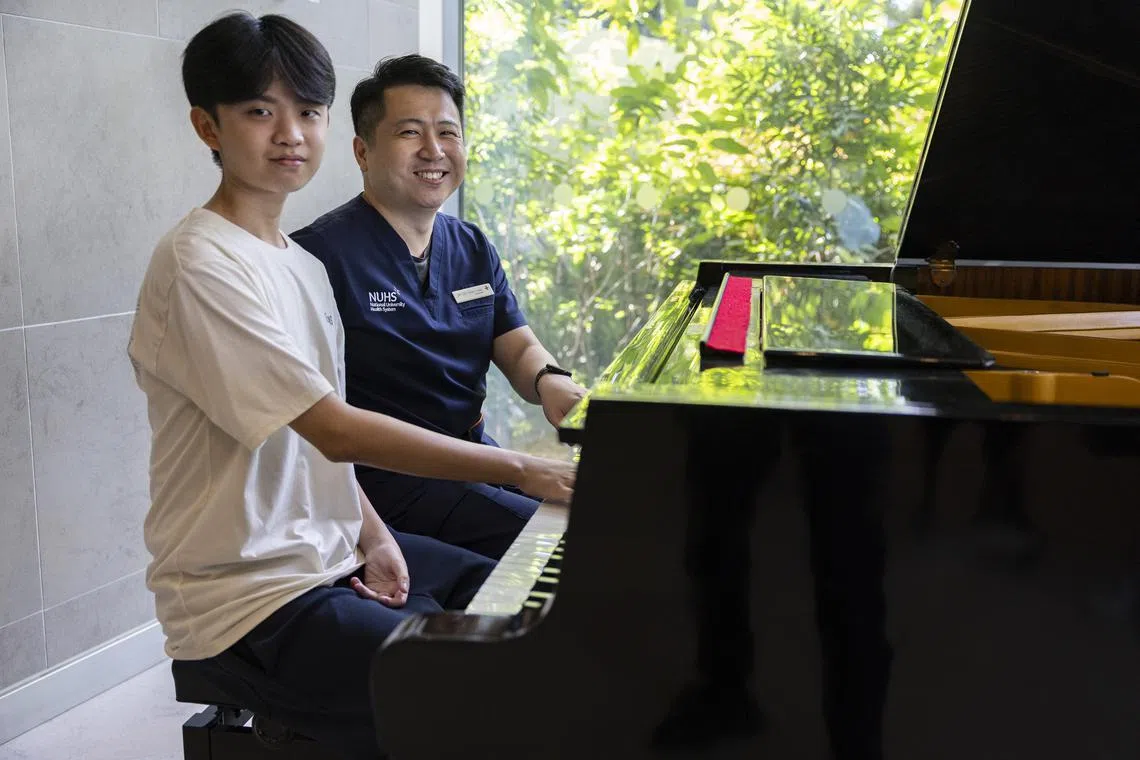Medical Mysteries
Body against liver: Teenager overcomes rare autoimmune condition after transplant
Medical Mysteries is a series that spotlights rare diseases or unusual conditions.
Sign up now: Get ST's newsletters delivered to your inbox

Ryan Lim from Ahmad Ibrahim Secondary School and his doctor Lee Yang Yang playing the piano at NUHS Tower Block on Aug 25.
ST PHOTO: BRIAN TEO
Follow topic:
- Ryan Lim, 17, had a liver transplant in 2023 due to autoimmune hepatitis (AIH) diagnosed at age five. Post-transplant infections led to depression.
- A surgeon, Dr Lee Yang Yang, bonded with Ryan over music, helping him cope. Ryan now hopes to work in healthcare.
- Ryan's father was initially a donor but was deemed ineligible. An altruistic donor was found, and the transplant was carried out on Sep 7, 2023.
AI generated
SINGAPORE – Teenager Ryan Lim slipped into depression after a series of post-transplant infections in 2023.
The Ahmad Ibrahim Secondary School student received a liver transplant on Sept 7, 2023 – 10 years after he was first diagnosed with autoimmune hepatitis (AIH).
It is a rare condition in which the immune system mistakenly attacks the liver, causing chronic inflammation and, in severe cases, liver failure. There are about two to five cases of AIH per 100,000 children worldwide.
Due to his infections, Ryan had to spend more time in the hospital to ensure that his body did not reject his new liver.
The teenager, who was looking forward to returning to school, felt that life had dealt him a harsh blow.
“I thought I could go back to a normal life after the surgery, like any teenager my age. Instead, I had to be in the hospital longer while doctors battled my infections,” said Ryan, who is now 17 years old.
He was five when his mother noticed a yellow hue in his skin and the whites of his eyes, and bloating in his abdomen.
“We rushed him to the emergency department of KKH (KK Women’s and Children’s Hospital), where he underwent tests,” said Mrs May Lim, 51, a part-time assistant at a school bookshop.
He was diagnosed with AIH and put on steroids and immunosuppressant medications to stop his immune system from attacking his liver.
“I got tired very easily and could not do things productively. I was also prone to falling sick often,” recalled Ryan.
Things took a drastic turn in 2021, when he was starting secondary school and looking forward to making new friends.
Then 13, he was struck by a bout of pancreatitis and was “in and out of hospital” in the first three months of that year, Ryan said. His spleen became inflamed and terribly painful.
In July 2021, he was diagnosed with another rare condition – primary sclerosing cholangitis, which attacks the bile ducts, causing chronic inflammation and scarring.

Ryan Lim with his father Lim Chang Kwan and his mother May Lim at NUHS Tower Block on Aug 25.
ST PHOTO: BRIAN TEO
Mrs Lim said: “That was when my ex-boss recommended Associate Professor Marion Aw from NUH (National University Hospital), and for the next two years, Prof Aw and her team managed Ryan’s (deteriorating) condition.”
Prof Aw heads the Division of Paediatric Gastroenterology, Nutrition, Hepatology and Liver Transplantation in the Department of Paediatrics at Khoo Teck Puat – National University Children’s Medical Institute (KTP-NUCMI).
According to her, there is “no exact reason” why a person is inflicted with AIH.
“It could be a combination of an underlying genetic predisposition with an environmental trigger, such as an infection. The target for the immune cells to ‘attack’ could be the liver cells or the bile ducts,” Prof Aw explained.
She said the treatment for AIH is immunosuppression, to prevent the immune system from attacking and damaging the liver cells.
“But when the immune system cannot be adequately controlled, there will be ongoing inflammation and injury to the liver, leading to chronic liver disease,” she said.
“When a person experiences end-stage liver disease, or complications of chronic liver disease, a liver transplant may be the option to cure the condition.”
With Ryan, Prof Aw noted there was evidence that his liver was hardening, and the option of a liver transplant was discussed with his parents.
Ryan’s father Lim Cheng Kwan, a civil servant, was the only suitable match in the family, as Ryan’s mother and elder sister were not eligible. Mr Lim was put through a suite of tests to ensure that he was healthy enough to donate part of his liver to his son.
But, just days before the surgery, devastating news arrived.
“The surgery was set for July 12, 2023, but two days before it happened, our doctors at Nucot (National University Centre for Organ Transplantation) informed me that they found an anomaly in my blood vessels in the final test and that I was no longer eligible to donate to Ryan. I broke down there and then,” said the 50-year-old, tearing up at the memory.
With their only hope shattered, the Lims spoke to their pastor, who made a plea to two separate congregations. A couple of months later, they found a match – an altruistic donor.
On Sept 7, 2023, the transplant was carried out by Adjunct Associate Professor Vidyadhar Mali, surgical director of the paediatric kidney and liver transplantation programmes at NUH.
Dr Lee Yang Yang, a consultant from the Department of Paediatric Surgery at KTP-NUCMI and a member of Ryan’s care team, said a part of the left lobe from a donor liver – less than a third of the organ – is usually taken as a graft for a child recipient.
While nothing delights kidney transplant surgeons like the first healthy stream of urine, liver transplant surgeons celebrate only when a new liver turns pink – a sign of life.
Prof Mali said: “We often focus on getting through the transplant itself – but for the team, true success is seeing a child transplant recipient return to school, to normal activities and play, and grow up to a full life.”
Just when everyone thought Ryan would be discharged a week after the transplant, his body was racked with infections that kept him in the hospital for five months.
Depression soon followed, but Ryan said he “emerged from his dark place” with the help of Dr Lee, who bonded with him over music.
The surgeon, who is an accomplished pianist, was amazed when he saw Ryan attempting to play classical pieces on a toy keyboard in the playroom.
Dr Lee told The Straits Times that it was the first time he had seen anyone playing classical music on a toy keyboard. He started bringing Ryan music scores, and they spent time tickling the ivories.
Two years on, Ryan is back in school and will sit the N-level and O-level exams at the end of the year.
For someone who once did not dare to dream, his future is now finally within sight.
“I hope with the second chance I have been given, I will be able to pay it forward,” said Ryan. “I hope to join the healthcare industry to help children who are in the same plight – if not as a doctor, then as a physiotherapist.”


